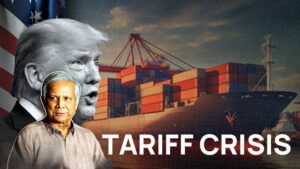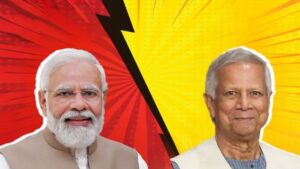
A proposed 35% tariff on Bangladeshi garment exports to the United States is anticipated to have far-reaching consequences beyond the US $ 8 billion annual shipments, according to industry experts and economists. The impending tariff hike, scheduled to take effect on 1st August, could ripple through Bangladesh’s entire economic ecosystem, impacting fabric suppliers, textile mills, banks, insurers and millions of workers.
During a roundtable organised in Dhaka, business leaders expressed deep concerns over the potential fallout. AK Azad, chairman and CEO of Ha-Meem Group, warned that if Bangladesh fails to negotiate effectively, the entire supply chain, from raw material suppliers to exporters, could suffer.
The increased duties, which are a significant jump from the previous 16% duty and the recent 35% announced in July, are set to disrupt trade flows. The US had temporarily paused the higher tariff implementation for 90 days, but the deadline looms. Industry insiders noted that US buyers have been frontloading orders, causing a surge in exports during the first five months of the year, but uncertainty remains about future demand.
Rubana Huq, former president of the Bangladesh Garment Manufacturers and Exporters Association (BGMEA), emphasised that the impact would extend beyond US-bound shipments.
Mahmud Hasan Khan, current BGMEA president, highlighted the challenges faced by factories heavily reliant on US markets. While some may shift focus to markets like Canada, Japan, or Australia, this could lead to market flooding and price drops in those regions.
Experts also pointed out that the US market itself may contract if tariffs increase across multiple supplier countries. Mohammad Abdur Razzaque, of think tank RAPID, estimated that a 20% tariff on key imports could shrink US garment imports by US $ 16 billion, intensifying competition in Europe and other markets.
Industry voices called for proactive government action. Azad urged the government to negotiate with US authorities before the August deadline, emphasising that brands have made it clear they will not absorb additional costs.
There was also a call for diversification of supply chains and markets. Kihak Sung of Youngone Corporation advised Bangladesh to reduce dependence on China and explore alternative sourcing options. He also suggested negotiating for a grace period to allow companies time to adapt.
In addition, former foreign affairs adviser Iftekhar Ahmed Chowdhury recommended assembling a joint public-private expert team to lead negotiations. He warned against overreacting to China’s rising influence and stressed the importance of diversifying procurement and production locations.
Economist M Masrur Reaz highlighted the urgency of damage control, emphasising that Bangladesh’s economic survival depends on swift and strategic responses. He suggested exploring broader US interests, such as energy, agriculture and aviation to forge strategic partnerships that could mitigate tariff impacts.
As the deadline approaches, industry stakeholders warn that failure to reach a favorable agreement could lead to significant economic and social upheaval, including mass job losses and declining industrial competitiveness. The government and private sector are urged to work together urgently to navigate this impending crisis.






